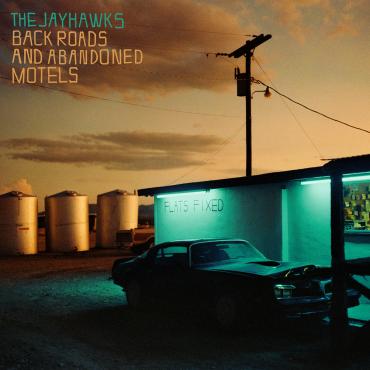
It’s just perfect that the Jayhawks’ new album is called Back Roads and Abandoned Motels. As we travel back roads, we encounter not only the unadorned beauty of untouched scenes — which can lull us into peaceful exclamations about the beauty of nature or the joy of a quiet moment — but we also find ourselves awash in loneliness, darkness, distance from community, sometimes wondering how we got to this place of jagged desolation in our lives. In the same way, motels can be places where we celebrate love and relationships, but they’re just as often waystations where we can find the anonymity and solitude we crave. Abandoned motels, like back roads, though, are forgotten places, bereft of the life that once occupied them. The songs on Back Roads and Abandoned Motels ramble along the roads of broken love, the end of friendships, the loneliness that grows from the illusions of our memories, as well as the comfort of a lover’s arms when the “world’s on our shoulders.”
The Jayhawks’ current lineup includes Gary Louris on guitars and vocals, Marc Perlman on bass, Tim O’Reagan on drums and vocals, Karen Grotberg on piano and vocals, and John Jackson on acoustic guitar, mandolin, and violin. Ten of the twelve songs on the album are newly recorded versions of songs Louris co-wrote with others and that others recorded. Louris wrote the other two songs, and they appear here for the first time.
The album opens with the multilayered “Come Cryin’ to Me,” which Louris co-wrote with the Dixie Chicks. The song’s opening bars wallow in a moody, minor-chord funk before Karen Grotberg slides in with her glimmering vocals. The funk builds slowly into a punchy, horn-driven tune with backing vocals almost joyously exclaiming that it’s okay to “come cryin’ to me/when you can’t keep from hiding/and when there’s nowhere to run to.” Grotberg’s gospel-inflected piano chords play call and response with Louris’ and Jackson’s guitars on “Everybody Knows,” which features Eric Heywood’s mournful steel guitar licks floating under a chorus of “ooh-oohs” in the chorus. The song’s sonic structure recalls early Poco. The Celtic-flavored opening of “Bitter End” blossoms into a rousing drinking tune by the song’s chorus that celebrates friendship while at the same time mourning its end. The Beatles-esque “Long Time Ago,” featuring George Harrison-like lead riffs on the bridges, embraces the sweetness of regret even as it acknowledges that memory is illusory and knowledge is transitory. The anthemic ballad “Carry You to Safety,” one of the two recent songs that Louris wrote, surrounds us with a wall of sound, much as the singer wraps reassurance around his lover. Each line in the song’s verses squeezes too many words into it, so that the words tumble over each other and the verses feel forced; some of the rhymes also feel forced: “not very long you were a total stranger/now suddenly you are a real life-changer.” A life-changer? Louris writes powerful lyrics, but this comes across as pedantic. The blue jazz chords and mournful backing vocals of “Leaving Detroit,” Louris’ other new song, brilliantly mirrors the aching regret, the ragged desolation, the lost hope of a broken relationship.
The Jayhawks deliver, as usual, pure, crystalline melodies and harmonies layered over a shimmering wave of sound. Back Roads and Abandoned Motels transports us into the mundane moments of life, infusing them with a beauty that allows and encourages us to embrace those moments, since they’re all we really have.




